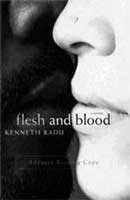
Flesh And Blood
Kenneth Radu
Harper Collins
$32
hardcover
288pp
0-00-225505-7
Enter Bobby Washington, grandson of a slave, son of a “full-blooded Sioux” and landlord to these descendants of Romanian farmers, Rose, Jacob, and their children, Eva and Nicky.
Mr. Washington takes a shine to Rose. He buys her a dress and lets her family off easy with the rent. And when no one’s looking, he invites Rose into his part of the house and serves her carrot cake and coffee and you can guess the rest.
Rose has never had it so good.
The overriding question of her life, and of the novel, becomes: Should she stay or should she go? Stay with Jacob or go with Bobby? The choice couldn’t be more clear to the reader, painted in black and white, right?
Not so fast. There are children involved … and there’s this matter of freedom. Does it really exist? For whom?
Flesh and Blood, a story of poverty, heartbreak, and empty promises, is set in the era gearing up to World War II. The action is grounded in Essex County, Ontario, and in the rural environs of Leamington, Chatham, and Windsor. But the forces at play in Kenneth Radu’s fourth novel – race, poverty, freedom – find their source waters elsewhere and betray an imaginative reach far beyond this border country.
Bobby Washington, landowner, is shackled by his past. Over the idea of running off with Rose, he reflects: “How easy to persuade himself that the world would not pursue them like overseers after escaped slaves.”
In Rose we see how real poverty places limits on freedom. Hers is a life of drudgery and compromise, of survival day to day. About her lot in life, Rose muses: “Working in a food-processing plant was not so different from slaving at home.”
The reader sees where Radu is going with this, all too clearly. The juxtaposition of Bobby’s heritage (grandson of a slave, remember) and repeated references to Rose’s “slaving at home,” struck me as false, facile if not disingenuous. But is this an example of Rose’s lazy thinking or Radu’s lazy writing? It’s hard to tell.
Certainly there are plenty of memorable lines of description throughout these pages. Cabbage “as tight and smooth as a skull.” A woman with scoliosis, walking, “her left hip surging out like a boat about to be launched.” But alongside these examples, there is some badly clichéd and mannered prose, a folksy rendering, one suspects, of simple folk. Case in point: “Why that honky jerk of a husband couldn’t get a job, Bobby didn’t know.” Later, life-challenged Jacob sizes up Bobby as “a pretty strong-looking buck.” Honky jerk of a husband? Strong-looking buck? I don’t think so.
The real threat to our suspension of disbelief is Rose. So sheltered is she that when Bobby recounts the story of his family’s flight from the plantations via the Underground Railway, Rose interrupts him:
“Slavers? What do you mean?”
Just when the reader might roll his or her eyes, Bobby too is dumbfounded:
“Why was he talking to this woman? Didn’t she know anything?”
At this point, I realized that my fate as a reader was tied to Bobby’s fate. But while Bobby gets a lover out of the deal, the reader inherits a point of view that, for the most part, is too loyal to Rose and her way of seeing things. mRb






0 Comments